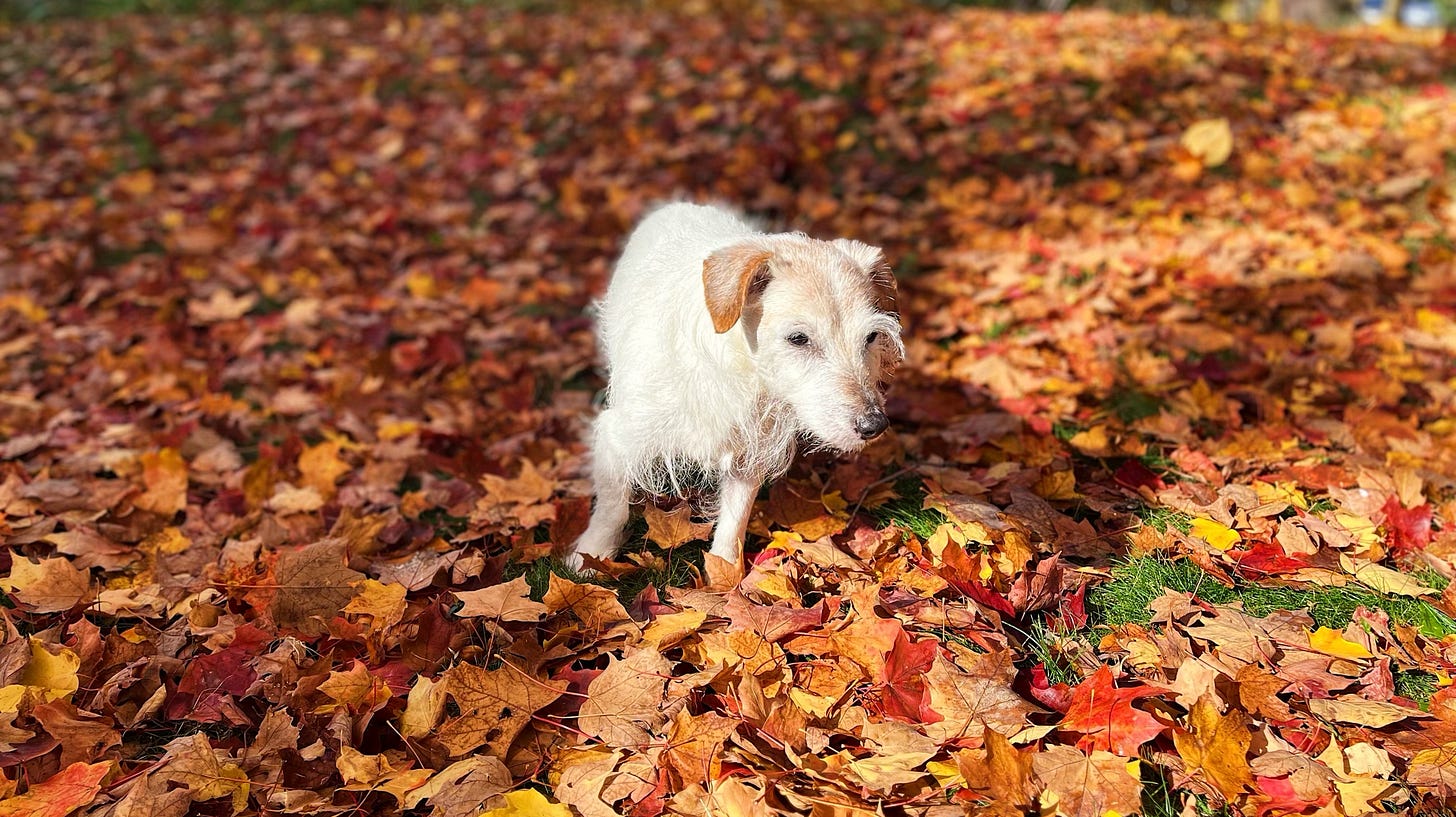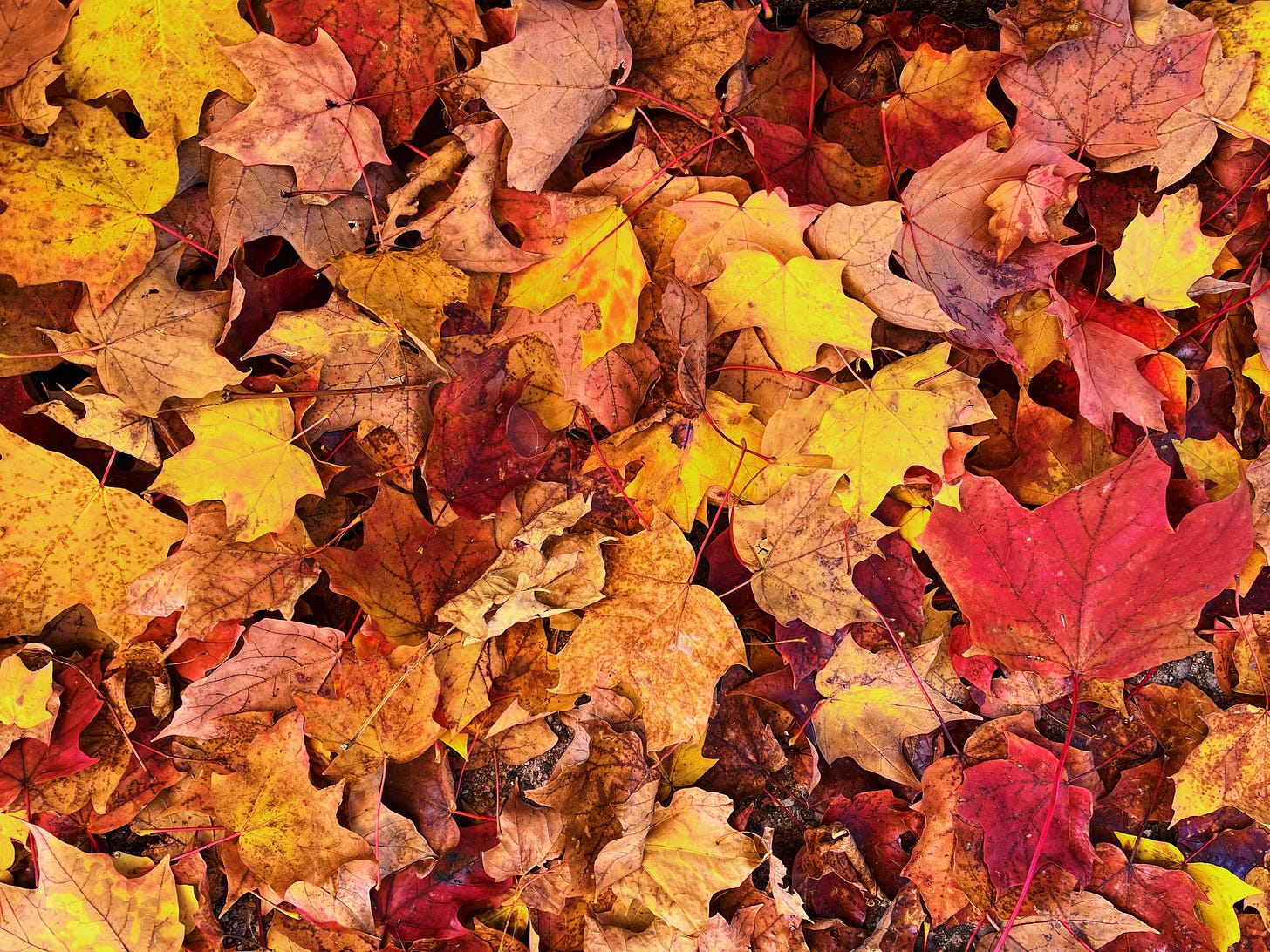Fallen Leaves
Some fragmented thoughts on the colors of autumn, life and death, white-bean soup, a song that evokes fond memories, and the Farminary
Thursday, October 27
Grand Rapids, Mich.
Hello, friendly reader.
The sugar maple out front has blanketed our yard in yellows, oranges, browns, and reds. We got a big rain earlier this week, but today is a beautiful, blue-sky day, and in the sunlight, the colors dazzle—crimson and ochre, russet and gold. Across the street, there’s a pair of red maples. Fozzie loves to wade straight through the midst of the big pile of leaves underneath, like some canine Moses parting a red sea.
Down the block, one of our neighbors, who keeps the most fastidious yard, has already raked up most of what’s fallen; hers is probably the only unbroken stretch of green grass left on our street. Then there’s the kid around the corner whom we’ll often see—really, usually hear—outside his house with the leaf blower. I have never witnessed him making anything resembling a pile of leaves. Mostly, he seems just to blast the leaves here and there, standing in the midst of his artificial tornado.
So far, we’ve left the blanket on our yard. I’d like to say that’s intentional. But honestly, it’s mostly inertia, bolstered by this story that NPR ran a couple of days ago about the value of fallen leaves.
The story reminded me how much we love our tidy binaries, even though nature consistently offers a different, more nuanced narrative. The fallen leaves challenge the neat line we sometimes like to draw between life and death. Yes, they have left their home in the tree, but you can’t exactly say that they’re devoid of life. They nourish the ground beneath, sending their nutrients into the soil. Fungi spring up where they have come down. And they provide shelter and sustenance for small creatures too—a home for invertebrates, a playground for Fozzie, foraging territory for neighborhood squirrels. Even in their fallen state, the leaves still participate in life’s flourishing.
This is the place in the letter where I’d usually go searching for some metaphor, my eyes glancing out the window at the leaves, rooting around for deeper meaning. Then I remembered the voice of Nate Stucky, my dear friend and beloved professor at the Farminary. We were standing by the pond one day when he asked me what it might feel like to just sit with the beauty rather than trying to wrestle with what else it could become. “What if you just let it be?” he said. “What if you just let it be what it is?”
Today, that feels right. There’s magic and miracle in the leaves themselves, doing what they do. That’s enough. Sometimes it’s just good to say, “That’s enough.”
What I’m Cooking: La Villa, our beloved neighborhood pizza place in Brooklyn, would sometimes have on its specials menu an escarole and white-bean soup that we adored. Tristan has been asking for quite a while whether I might be able to do some version of it at home, which is one reason I planted escarole this year, along with white beans.
I’ve learned that food in restaurants often tastes so much better than what we eat at home because of two key things: fat and salt. Or, to be more precise, lots of fat and lots of salt. So, a couple of weeks ago, I took some of the dried Drabo soup beans that I’d harvested, soaked them overnight, and then cooked them according to this recipe from Carla Music in Bon Appetit.
I made some meatballs (just ground pork, salt, and pepper, rolled into little nuggets about an inch in diameter), browned them well on all sides in a frying pan, and set them aside. The rendered pork fat in the pan went into my pot of simmering beans. Then I chopped up all the escarole I’d collected in the garden and added that too. (Escarole is a cut-and-come-again green. I took the outer leaves and left the smaller inner ones to keep growing.) Escarole works so well in the soup because the gentle bitterness of its greens provides a counterpoint to all the fat. I added a little more chicken broth and let it simmer for five or ten minutes before plopping the meatballs in to warm up again. Because we were feeling gluttonous, I finely grated a healthy scattering of Pecorino on top.
It was the perfect, hearty soup for a chilly autumn evening.
What I’m Listening to: I’m wading through the thick muck of some difficult relational dynamics with a couple of people I love right now. Amidst all that, the singer-songwriter Spencer LaJoye’s pure voice, accompanied by comforting strings and the strum of a guitar, came through on my Spotify. Spencer performed a couple of songs at Evolving Faith 2022, but “Where the Air Is Clearest” wasn’t one of them. This track was new to me. It gently urged me to summon simpler memories. And it reminded me not to forget past delights and shared happinesses, which, in moments of stress and strain, are so easily buried. Perhaps you’ll appreciate this exhortation too.
Two other Farminary-related notes:
1. I’ve written about this blessed farm before, but for those of you who aren’t familiar with it, it’s the 21-acre sustainable space that doubles as the best classroom at Princeton Seminary. The seminary just announced a new 13-month masters program centered on the farm. Students pursuing the master of arts in theology and ecology (MTE for short, because I guess MATE didn’t bring to mind the goal they were going for) will do the majority of their coursework at the farm. Studying at the Farminary changed my life, and if you’re interested in exploring the spiritual lessons of the soil in an innovative academic setting, I commend the Farminary to you.
2. I think I forgot to tell you all that I am writing a book about my time at the Farminary. Oops! The book is tentatively titled Good Soil, and I’ll be working with Derek Reed, a wonderful human who also edited Cole Arthur Riley’s luminous This Here Flesh and Austin Channing Brown’s powerful I’m Still Here. Tristan says that I really should get it done quickly, because it will be a little weird if I’m collecting Social Security and still talking about my grad-school days.

I would be grateful for your prayers—and I always count it a privilege to pray for you. Feel free to share with me what’s on your hearts and minds.
That’s all for this week. As ever, I’m so grateful we can stumble through all this together, and I’ll try to write again soon.
Much love,
Jeff







So many of your newsletter words have resonated with me. But today I was overwhelmed at how well you captured this heartrending season, "wading through the thick muck of some difficult relational dynamics with a couple of people I love right now". I've no idea which way to go or what to do at this point. But I'm comforted a bit that others are traveling this way too. I hope your muck resolves itself and that you find respite and hot tea when needed.
I really love this. I hate seeing people gather their leaves into bags to be thrown into the trash when they could be left to nature. There is something about witnessing the true death and rebirth that God shows us in nature with each season.